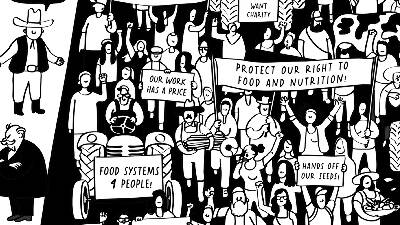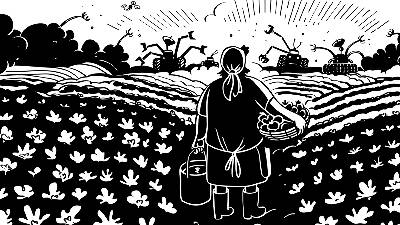Governments must reject corporations’ for-profit hunger solutions
Activists urge UN member states to reject false solutions to world hunger from corporations pursuing profits as GNRtFN launches Right to Food and Nutrition Watch exposing ‘wrong menu’ offered by industrial food systems
Thousands of peasants, indigenous peoples, pastoralists and activists from the Global Network for the Right to Food and Nutrition (GNRtFN) have called on national governments to reject false, profit-oriented solutions to hunger and malnutrition advanced by corporations at the recent UN Food Systems Summit (UNFSS).
The appeal coincided with the annual publication of the network’s Right to Food and Nutrition Watch, Not Our Menu: False Solutions to Hunger and Malnutrition – which highlights the devastating human cost of the industrial food system, not least its failure to address growing world hunger and malnutrition.
“The ‘Watch’ puts a spotlight on the suffering of peasants, fishers, and indigenous peoples – especially women who produce most of the world’s food – caused by the increasing power of agribusiness corporations,” said Arieska Kurniawaty, program officer of the national executive board of the Jakarta-based Solidaritas Perempuan (Women’s Solidarity for Human Rights), a member of the GNRtFN.
“It shows that hunger and malnutrition are political issues and not supply or productivity challenges to be solved with techno-fixes,” she added, amid this month's observance of the World Food Day and this year's 25th anniversary of the launching of the food sovereignty paradigm during the 1996 World Summit in Rome as a direct challenge to market-based food security solutions promoted via the World Trade Organization.
“And if the UN continues to facilitate the corporate takeover of food, boosting industrial food production, expanding their access to markets and huge profits, people will face even tougher struggles ahead to find decent work and feed their families,” said Charlotte Dreger, policy advocacy officer for sustainable food systems at FIAN International, secretariat of the network.
‘Plates of Injustices’
The Watch was unveiled during an online seminar where speakers from the National Fishworkers' Forum, Movimento dos Trabalhadores Rurais Sem, FoodShare Toronto, Cornell University, and FIAN International discussed the role of states and intergovernmental organizations in tolerating and even promoting false, for-profit solutions for feeding the world.
The publication includes a popular supplement, Plates of Injustices, which encourages people to consider that, although access to food is matter of life and death, we are becoming more and more disconnected from how it is produced.
“We are urging member states of the UN to refuse to hand corporations the power to decide what is best for their people,” said Dreger.
“The UN summit merely served as a political loudspeaker for transnational agribusinesses and financial institutions to perpetuate their old and failed ways of claiming to feed the world. It has expanded opportunities for corporations to further influence national governments towards treating food as a commodity rather than a human right.”
Paving the way for corporate takeover
UN Secretary-General António Guterres convened the food summit in September in close partnership with the World Economic Forum, a private sector organization representing the world’s wealthiest corporations. Its conclusions have paved the way for mega corporations to squeeze greater profits from people and nature through so-called follow-up “action areas” and a new Rome-based “coordination hub” which risks undermining the whole UN multilateral system, warned the network’s members.
“We are concerned that the summit’s follow-up process undermines the most important and inclusive international platform of global food governance, the UN Committee on World Food Security, and the High Level Panel of Experts on Food Security and Nutrition, which is the most innovative scientific policy interface in this field,” said Sofía Monsalve, secretary general of FIAN International.
“With its follow-up actions, the summit strongly promotes a multi-stakeholder governance model, which dangerously places corporations on an equal footing to elected representatives and communities,” she added.
“This undermines multilateralism, democracy and human rights.”
Corporate capture of hunger solutions
The UN summit created more than 25 multi-stakeholder “solution coalitions”, tasked with finding solutions to hunger and malnutrition in line with the UN Sustainable Development Goals.
A closer look at the composition of these coalitions reveals excessive corporate influence. Many are either headed or influenced by experts, scientists and consultants working for corporations or groups with close links to multinationals.
For example, the Zero Hunger Private Sector Pledge that supports the Coalition of Action for Achieving Zero Hunger, was started by the Geneva-based Global Alliance for Improved Nutrition (GAIN).
The non-profit GAIN is financed by multinationals such as Unilever and Arla Foods along with the Melinda and Bill Gates and Rockefeller foundations. The Melinda and Bill Gates and Rockefeller foundations also finance the Alliance for a Green Revolution in Africa (AGRA). Former Rwandan agriculture minister Agnes Kalibata, president of AGRA, is the UN chief’s special envoy to the UNFSS.
Another example is the Coalition of Action 4 Soil Health that emerged from the summit’s Soils Investment Hub. According to the UNFSS, the hub aims to “create a critical mass of food and agriculture value chain companies and key stakeholders that drive alignment of investment decisions, mechanisms and capital towards scaling healthy soil agriculture practices.”
A briefing paper shared online by the UNFSS reveals that the Hub’s “inspiration” for its soil “solution” was taken from a 2018 paper entitled The Business Case for Investing in Soil Health, published by the World Business Council for Sustainable Development (WBCSD), a global private sector organization of over 200 leading businesses. The members of the WBCSD include fertilizer, chemical and seed companies such as BASF, Bayer, Cargill, Corteva, DuPont, Nutrien, Sumitomo Chemical, Syngenta, UPL OpenAg, and Yara.
States urged to transform corporate food systems via agroecology
In a political declaration signed by more than 1,000 international, regional and local organizations and individuals, the People's Autonomous Response to the UN Food Systems Summit denounced the UNFSS “for disregarding the urgent need to address the gross power imbalances that corporations hold over food systems” and to reject “false solutions which will continue to oppress and exploit people, communities and territories.”
It also urged governments, and regional and international institutions, to “support” their “constituencies’ pathways for transforming corporate food systems through agroecology and food sovereignty.”
“The first step on this path is fully recognizing, implementing, and enforcing the human right to adequate food, which is a human rights obligation of states and UN agencies,” it added.


